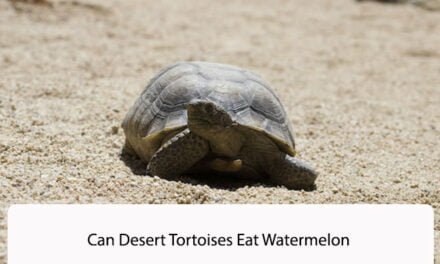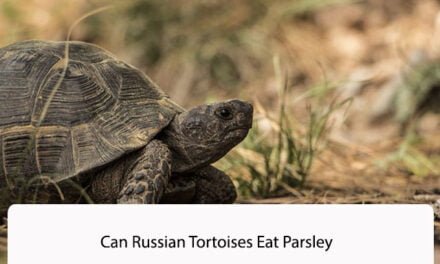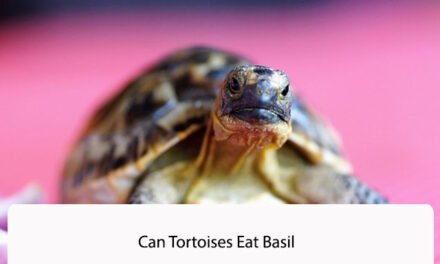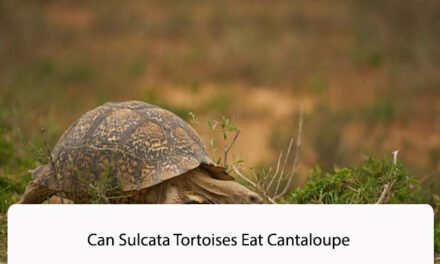Tortoises are fascinating creatures that have been around for millions of years. They are known for their slow movements, hard shells, and herbivorous diets. As tortoise owners, we want to make sure that we are providing our pets with a healthy and balanced diet. One question that often comes up is whether or not tortoises can eat cauliflower.
Cauliflower is a popular vegetable that is low in calories and high in nutrients such as vitamin C, vitamin K, and fiber. However, when it comes to feeding tortoises, we need to be careful about what we offer them. While some vegetables are safe and healthy for tortoises to eat, others can be harmful or even toxic.
So, can tortoises eat cauliflower? The answer is yes, but in moderation. While cauliflower is not toxic to tortoises, it should not make up a large part of their diet. As with any new food, it is important to introduce cauliflower slowly and in small amounts to avoid digestive issues.
Understanding Tortoises’ Dietary Needs

When it comes to feeding tortoises, it is essential to understand their dietary needs. Tortoises are herbivores and require a diet rich in fiber, vitamins, and minerals. A well-balanced diet is crucial for their growth and overall health.
Tortoises have a unique digestive system that requires a high-fiber diet to maintain healthy digestion. A diet that is too low in fiber can lead to digestive problems, such as constipation or impaction, which can be life-threatening.
In the wild, tortoises feed on a variety of plants, including grasses, weeds, and leafy greens. They also consume fruits and flowers when available. In captivity, it is essential to replicate their natural diet as closely as possible.
When choosing vegetables for your tortoise, it is important to consider the calcium to phosphorus ratio. Tortoises require more calcium than phosphorus in their diet to maintain healthy bones and shells. Vegetables that are high in calcium and low in phosphorus include kale, collard greens, and turnip greens.
Cauliflower is a low-calorie vegetable that is safe for tortoises to eat in moderation. While it is not a significant source of calcium, it does contain vitamins C and K, which are essential for overall health.
In summary, tortoises require a high-fiber diet rich in vitamins and minerals. When feeding vegetables, it is crucial to consider the calcium to phosphorus ratio. Cauliflower is a safe vegetable for tortoises to eat in moderation and can provide some essential vitamins.
Can Tortoises Eat Cauliflower?
Cauliflower is a cruciferous vegetable that is low in calories and high in vitamins and minerals. It is a good source of dietary fiber, vitamin C, vitamin K, and folate. But can tortoises eat cauliflower?
After researching, we have found that tortoises can eat cauliflower in moderation. It is important to note that cauliflower should not be a staple food in their diet. Instead, it should be fed as an occasional treat.
Cauliflower contains goitrogens, which can interfere with the thyroid function of tortoises if consumed in large quantities. Therefore, it is important to feed cauliflower in small amounts.
When feeding cauliflower to tortoises, it should be chopped into small pieces to make it easier for them to eat and digest. It is also recommended to steam or boil cauliflower to make it softer and easier to digest.
In conclusion, tortoises can eat cauliflower as an occasional treat, but it should not be a staple food in their diet. It is important to feed cauliflower in moderation and in small pieces to avoid any potential health risks.
The Nutritional Value of Cauliflower for Tortoises

Cauliflower is a nutritious vegetable that can provide several health benefits to tortoises. In this section, we will discuss the nutritional value of cauliflower for tortoises.
Vitamins and Minerals
Cauliflower is a good source of vitamins and minerals that are essential for the growth and development of tortoises. It contains high levels of vitamin C, which can help boost the immune system and protect against disease. Additionally, it is rich in vitamin K, which is important for blood clotting and bone health.
Cauliflower also contains several minerals, including potassium, calcium, and magnesium. Potassium is essential for maintaining healthy blood pressure, while calcium and magnesium are important for strong bones and teeth.
Fiber Content
Cauliflower is a good source of fiber, which is important for maintaining a healthy digestive system in tortoises. Fiber helps to regulate bowel movements and prevent constipation. It can also help to reduce the risk of certain digestive disorders.
In conclusion, cauliflower is a nutritious vegetable that can provide several health benefits to tortoises. It is a good source of vitamins, minerals, and fiber, which are essential for the growth and development of tortoises.
Potential Risks of Feeding Cauliflower to Tortoises
When it comes to feeding tortoises, it’s important to be aware of the potential risks associated with certain foods. While cauliflower can be a healthy addition to a tortoise’s diet, there are some risks to keep in mind.
Digestive Issues
Cauliflower is a cruciferous vegetable, which means it contains a compound called glucosinolate. This compound can be difficult for tortoises to digest, leading to digestive issues such as bloating, gas, and diarrhea. In some cases, feeding too much cauliflower can even lead to more serious digestive problems.
To avoid digestive issues, it’s important to feed cauliflower in moderation and to make sure it’s cooked thoroughly. Raw cauliflower can be especially difficult for tortoises to digest.
Nutritional Imbalances
While cauliflower is a good source of certain nutrients, such as vitamin C and fiber, it’s important to remember that it’s not a complete food for tortoises. Feeding too much cauliflower can lead to nutritional imbalances, which can have negative effects on a tortoise’s health.
To avoid nutritional imbalances, it’s important to feed a variety of foods in addition to cauliflower. This can include leafy greens, fruits, and other vegetables.
In summary, while cauliflower can be a healthy addition to a tortoise’s diet, it’s important to be aware of the potential risks. Feeding cauliflower in moderation and in combination with other foods can help ensure your tortoise stays healthy and happy.
Serving Cauliflower to Tortoises

When it comes to feeding tortoises, it is important to ensure that they are getting a balanced diet that meets their nutritional needs. While tortoises can eat a variety of fruits and vegetables, not all foods are safe or suitable for them. In this section, we will discuss how to serve cauliflower to tortoises.
Portion Size
As with any food, it is important to feed cauliflower to tortoises in moderation. While cauliflower is safe for tortoises to eat, it should not make up a large portion of their diet. We recommend that cauliflower be fed as a treat or supplement to a balanced diet that includes a variety of other vegetables and fruits.
The amount of cauliflower that should be fed to a tortoise will depend on its size and age. As a general rule, a small amount of cauliflower (about the size of a quarter) is sufficient for an adult tortoise. For younger tortoises or smaller species, a smaller portion size should be used.
Preparation Methods
Before serving cauliflower to a tortoise, it is important to properly prepare it. Raw cauliflower can be difficult for tortoises to digest and can cause digestive problems. We recommend that cauliflower be cooked or steamed before feeding it to a tortoise.
When cooking cauliflower for tortoises, it is important to avoid using any seasonings or additives. These can be harmful to tortoises and can cause health problems. Simply boiling or steaming the cauliflower until it is soft is sufficient.
In addition to cooking the cauliflower, it is important to cut it into small pieces that are easy for the tortoise to eat. Large pieces can be difficult for tortoises to chew and can cause choking or digestive problems.
Overall, cauliflower can be a healthy and nutritious treat for tortoises when fed in moderation and properly prepared. By following these guidelines, you can ensure that your tortoise is getting the nutrients it needs to stay healthy and happy.
Alternatives to Cauliflower for Tortoises
While cauliflower can be a healthy snack for tortoises, it is not the only option available. Here are some alternatives that you can offer to your pet:
1. Broccoli
Broccoli is a great alternative to cauliflower, as it is also a cruciferous vegetable that is rich in vitamins and minerals. It is also low in calories, making it a great choice for tortoises that need to watch their weight. Just like cauliflower, broccoli should be offered in moderation to avoid digestive issues.
2. Carrots
Carrots are another healthy snack that tortoises can enjoy. They are rich in vitamin A, which is essential for maintaining healthy eyesight and skin. Carrots are also low in calories and high in fiber, making them a great choice for tortoises that need to maintain a healthy weight. However, they should be offered in moderation, as too much can cause digestive issues.
3. Squash
Squash is a great alternative to cauliflower, as it is also low in calories and high in fiber. It is also a good source of vitamins A and C, which are essential for maintaining a healthy immune system. Tortoises can enjoy a variety of different types of squash, including butternut, acorn, and spaghetti squash.
4. Leafy Greens
Leafy greens such as kale, collard greens, and dandelion greens are also great options for tortoises. They are low in calories and high in vitamins and minerals, making them a healthy addition to your pet’s diet. However, make sure to offer a variety of different greens to ensure that your tortoise is getting a balanced diet.
Overall, while cauliflower is a healthy snack for tortoises, there are plenty of alternatives available that can provide your pet with the vitamins and nutrients they need to thrive. Just make sure to offer these foods in moderation and always consult with a veterinarian if you have any concerns about your pet’s diet.
Frequently Asked Questions

What vegetables can tortoises safely eat?
Tortoises can safely eat a variety of vegetables, including dark leafy greens like kale and collard greens, as well as carrots, squash, and bell peppers. It’s important to note that different species of tortoises have different dietary requirements, so it’s always a good idea to consult with a veterinarian or do research on your specific tortoise’s needs.
Can tortoises eat cauliflower leaves?
Yes, tortoises can eat cauliflower leaves. In fact, they can be a good source of nutrition for some species of tortoises. However, as with any new food, it’s important to introduce them slowly and monitor your tortoise for any adverse reactions.
Can Russian tortoises safely eat cauliflower leaves?
Yes, Russian tortoises can safely eat cauliflower leaves. However, as with any new food, it’s important to introduce them slowly and monitor your tortoise for any adverse reactions.
What foods are poisonous to tortoises?
Some foods that are poisonous to tortoises include avocado, rhubarb, and chocolate. It’s important to do research on any new food before feeding it to your tortoise to ensure that it is safe for them to eat.
Can box turtles safely eat cauliflower?
Yes, box turtles can safely eat cauliflower. However, as with any new food, it’s important to introduce them slowly and monitor your turtle for any adverse reactions.
Why can’t tortoises eat broccoli?
Broccoli contains a substance called goitrogens, which can interfere with the thyroid gland’s ability to produce hormones. This can lead to a condition called hypothyroidism, which can cause weight gain, lethargy, and other health problems in tortoises. As a result, it’s best to avoid feeding broccoli to your tortoise.





